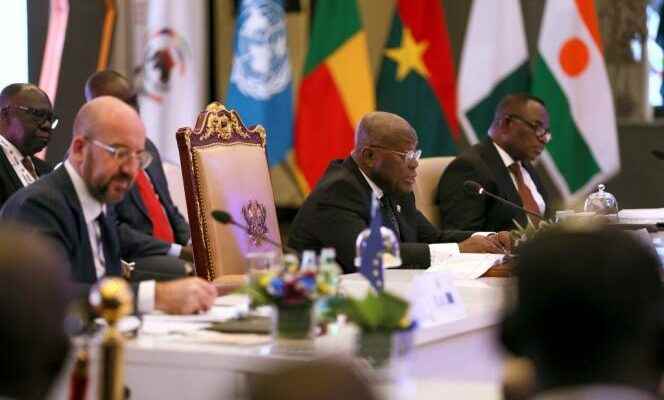To not miss any African news, subscribe to the newsletter of the “World Africa” from this link. Every Saturday at 6 a.m., find a week of news and debates covered by the editorial staff of the “World Africa”.
The summit between seven West African states, members of the Accra Initiative, and several European leaders to increase their cooperation in the fight against the spread of jihadist violence from the Sahel to the coasts of the Gulf of Guinea, ended on Tuesday evening, November 22, without any major announcement.
The presidents of Benin, Togo, Ghana, Côte d’Ivoire and Burkina Faso, as well as leaders of Niger and Mali thus met in Accra with representatives of the European Union, Great Britain and from France.
Launched timidly in 2017, the Accra Initiative aims to intensify regional efforts to deal with the growing threat of jihadist violence that plagues Mali, Burkina Faso and Niger, and could spread to coastal countries.
In recent months, the Initiative has taken on greater importance due to the increase in attacks in Benin and Togo, but also because their Western partners seek to redefine their strategy in the region, at a time when relations have largely deteriorated. degraded with the Malian junta, now close to Moscow.
Possible local recruitments
The deterioration of security in the Sahel “threatens to engulf the entire region of West Africa”warned Ghanaian President Nana Akufo-Addo at the opening of the meeting. “Terrorist groups, emboldened by their apparent success in the region, are looking for new areas of operation, a development that has led to an evolution of the threat to the south”he said. “For years, we have been talking about the risk of contagion of the terrorist threat from the Sahel to coastal statessaid the President of the European Council, Charles Michel, at the summit. Today, this is no longer a risk, it is a reality. »
At the end of this summit, West African leaders made no major announcements, according to the final communiqué sent to AFP. They noted, however, “partner commitments” to support the Accra Initiative and “recommended that concrete actions, particularly in terms of funding, be taken to support countries severely affected by terrorism”.
Jihadist violence in the Sahel began in 2012 in Mali, killing thousands and displacing millions. They have spread to neighboring Burkina Faso and Niger.
Benin, Côte d’Ivoire, Ghana and Togo now face the growing threat of fighters from the Islamic State (IS) group and Al-Qaeda, established in Niger and Burkina Faso, and who are now increasing the attacks on their territory. Concern is growing about possible local recruitments.
Damaged relationships
This summit was held at a time when several partners announced the withdrawal of their peacekeeping troops in Mali.
The blue helmets of the United Nations Multidimensional Integrated Stabilization Mission in Mali (Minusma) have been present since 2013, but the UN mission’s relations with the Malian authorities have deteriorated, leading to the announcement of the withdrawal of Egyptian contingents, Ivorian and British in particular.
Last week, the United Kingdom announced that it wanted “rebalance” its deployment in the region, without giving further details. As for the German government, it declared on Tuesday its intention to withdraw its contingent of Minusma soldiers by May 2024.
France completed in August the withdrawal of its troops who had been operating in Mali for almost ten years. But Paris, which still deploys some 3,000 soldiers in the Sahel, has given itself six months to finalize its new strategy in Africa.
